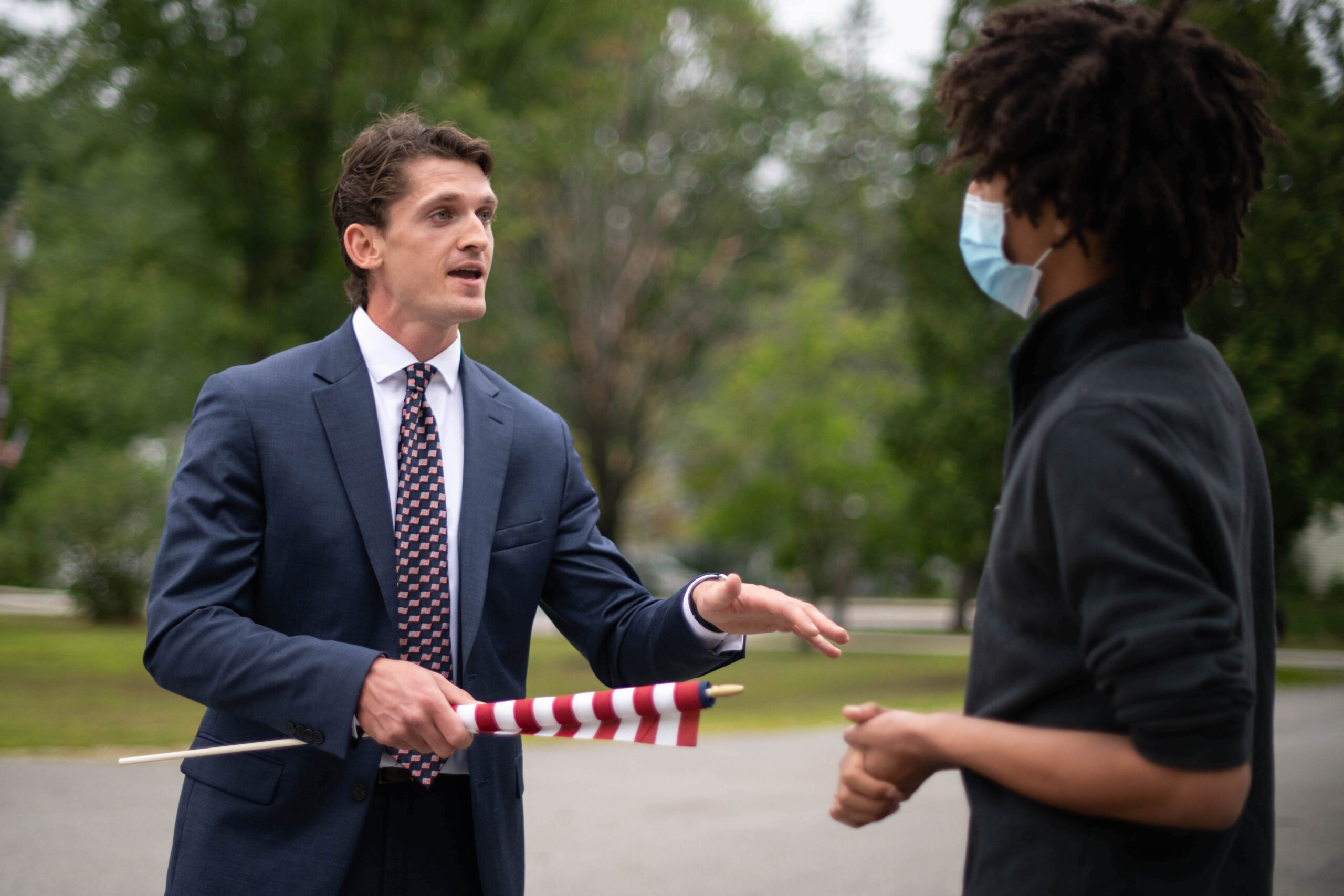
Greg Carter, left, tells Jonah Wheeler, right, both of Peterborough, New Hampshire, that systemic racism doesn’t exist during a “Pro-Police, Pro-America” rally in Peterborough in August, 2020. Photo by Ben Conant/Monadnock Ledger-Transcript
I recently joined a book discussion group through Facebook. The best thing about this was that the people were from so many different places and backgrounds. The book was Caste, which meant the topic was racism. And the reactions to the book were as different as the individuals present.
White people expressed amazement that they had gotten into their sixties without being aware of the systemic racism around them. They had not personally witnessed segregated facilities and many other consequences of the Jim Crow laws. In some cases, they didn’t even know about the Jim Crow laws. They couldn’t figure out why no one had ever told them. How had they not learned about these things?
Then there were the Black people who were also unaware for a surprising length of time. One woman told a story of discovering places at age 16 where she wasn’t welcome—places she thought her family avoided only because they were too expensive. Imagine what that would be like to realize at age 16 that you weren’t welcome in many places.
And then there were the stories of Black men growing up believing the disparaging comments that white people made about them and how hard it was to recognize those beliefs for what they really were and to destroy them.
Another Black woman explained her father’s challenge in raising her and her siblings. He wanted to encourage them, but not too much because it can be downright dangerous when a Black child does something to make white people think the child thinks she is smarter or better than a white person. As a parent, this sounded like an impossible task. How do you raise a child to be proud, but not too proud?
We all know of some of the lessons Black parents must teach their children to protect them from being arrested or shot for no reason. But during this discussion, I also heard that some Black parents don’t want to burden their children so they don’t necessarily speak openly and fully about their concerns and experiences. This was especially true among grandparents. The result, of course, was children growing without understanding the truth, the history, and the level of systemic racism standing in their way.
While Black parents don’t necessarily lay the full story on their children, many white people don’t discuss racism at all. White people who grew up in the south surrounded by clear signs of racism reported that racism was never a topic of discussion in the family.
Having traveled extensively through the south multiple times as a child, I had witnessed the separate restrooms, drinking fountains, and entrances. I had seen signs prohibiting Black people. Plus, growing up with liberal, activist, Unitarian parents, racism and social justice were frequent topics of conversation. And this was even in Minnesota where almost everyone we ever saw (except when traveling) was white.
The last story that struck me was the Black woman describing how shocked white people were when she explained that all she wanted was a fair chance in life and not revenge.
Wow! Our experiences and reactions could not have been more different!
At the close of this first meeting, I walked away with the following thoughts:
- We are all coming from completely different places and experiences.
- Whether you are Black or white, the behaviors and business practices that surround you are so familiar and so accepted that it is hard, if not impossible, to recognize that those behaviors and practices can be unfair, mean, insensitive, and unethical.
- We should admire and celebrate those willing to admit not having seen, heard, or understood until recently the evidence of systemic racism and other injustices surrounding them.
- We have to worry about those who can’t see it, knowing that every time they insist that there is no systemic racism postpones the day when they can recognize it and acknowledge it. Knowing also that there is a point where they never will see it because to do so will be too great a contradiction for them and they will be unable to change their tune and save face.
- Most people who can’t see the racism aren’t terrible, nor racist. They just haven’t had the experiences or conversations that provide an opportunity to see things differently. They aren’t less intelligent or less good; they are just coming from different places. No two journeys through life are the same.
- No one, regardless of color, who has grown up in a racist society can ever be sure that they have shed all their beliefs, behaviors, and blindness to racism that contribute to systemic racism.
Each of us is on a radically different journey. We are all very different. At the same time, we aren’t different where it matters most: our values. When people say that we are more alike then different, this is the distinction that matters. Despite all of our differences—geography, attitudes, traditions, conversations, experiences, beliefs, assumptions, perceptions, and habits—we are very alike when it comes to values. We value fairness, integrity, confidence, self-respect, good health, and the ability of families to take care of their own.
Let me close with one more vital distinction. We must be patient with people, not with the problem. We must listen carefully and share patiently to help each other on our journeys. We must also be patient with ourselves as we learn about our own misguided perceptions, beliefs, and behaviors. But we can’t be patient with the problem. We must do our part by standing tall and speaking up in the face of injustice when we recognize it.
![]() This article first appeared on Forbes, December 29th, 2020
This article first appeared on Forbes, December 29th, 2020



Comments are closed.